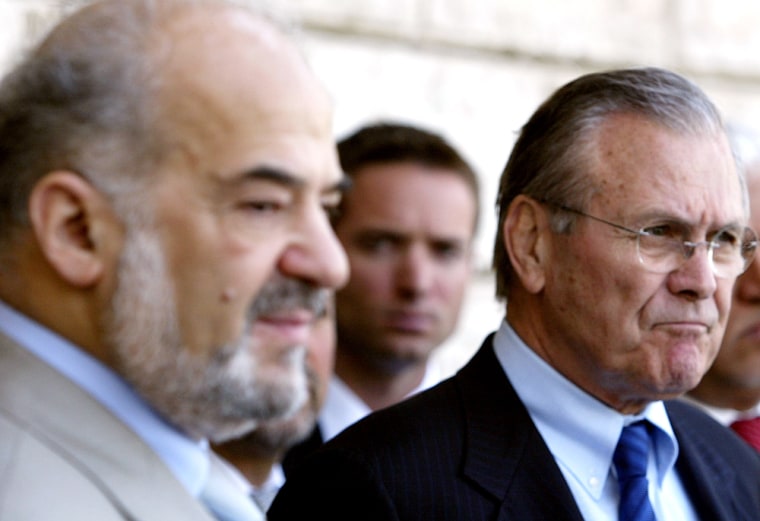Defense Secretary Donald H. Rumsfeld, on another quick visit to Iraq, pressed the country's new leaders Tuesday to avoid delays in developing a constitutional government and defeating the insurgency.
"Anything that would delay that or disrupt that as a result of turbulence or incompetence or corruption in government would be unfortunate," Rumsfeld said before he began a round of talks with Iraqi leaders.
The newly designated prime minister, Ibrahim al-Jaafari, told reporters after meeting Rumsfeld at his official residence that he realized the risk of setbacks in the political process.
Prime minister acknowledges ‘challenges’
"I don't deny there are challenges, but I am sure we are going to form very good ministries," he said in English. He predicted that the government bureaucracy would be staffed by "good technocrats" from a variety of backgrounds.
Rumsfeld met separately with Interim President Jalal Talabani, the Kurdish former rebel leader.
Leaders of Iraq's persistent insurgency also made a statement Tuesday, ambushing a convoy carrying Iraq’s deputy interior minister. Deputy Interior Minister Gen. Tariq al-Baldawi escaped unhurt after gunmen in two cars opened fire on his convoy in Baghdad’s western Adel neighborhood, but a bodyguard was killed and al-Baldawi’s son and two other people were wounded, an official in the ministry said.
In other violence, five Iraqi civilians were killed and four others wounded in a suicide bombing in Mosul, and seven Iraqis — two of them police officers — were wounded in attacks in Kirkuk.
In a joint appearance before reporters after their meeting, Rumsfeld and Talabani struggled to make themselves understood to a mixed Iraqi-American press corps. At one point Talabani translated for Rumsfeld as the defense secretary fielded a question from an Iraqi speaking in Arabic. After hearing Talabani's version of the question, Rumsfeld accused the reporter of phrasing it inaccurately, and the garbled exchange ended abruptly as another Iraqi posed another question.
Speaking in English, Talabani said he had assured Rumsfeld that Iraq's interim leaders will work together.
Cabinet selection nearing conclusion
"We are planning to have the (permanent) government as soon as possible, but you know this is the beginning of democratization in Iraq," Talabani said, adding that he expects the government to complete its selection of Cabinet ministers before the end of this week. The next major goal is to have a new constitution written by August and ratified by a national vote in October.
Rumsfeld also held a closed meeting with Gen. George Casey and Lt. Gen. John Vines, the top two American commanders in Iraq. In a brief interview with reporters later, Casey said he was encouraged that the long and difficult process of training and equipping Iraqi security forces was gaining ground.
"We're getting better and more efficient at it," he said.
The Iraqis, in turn, have gained a new measure of confidence since the Jan. 30 elections.
"Iraqi security forces are operating more aggressively" against the insurgents, Casey said.
Rumsfeld also gave a pep talk to a few hundred soldiers at Camp Liberty, headquarters of the 3rd Infantry Division. He also pinned Bronze Star medals and Purple Heart awards on several soldiers and participated in a mass re-enlistment ceremony for about 100 soldiers gathered in a mess hall.
‘A critically important role’
"The role you're playing is a critically important role in the global war on terrorism" he told them.
Rumsfeld arrived in the Iraqi capital before sunrise aboard an Air Force C-17 cargo plane for his second visit in three months. It was his ninth visit since the war began in March 2003.
The frequency of his visits in recent months reflected a desire to push the political and military momentum that Rumsfeld believes has been growing since the Jan. 30 elections for a national assembly.
En route from Washington, Rumsfeld told reporters he would press the new Iraqi leadership to avoid delays on either the political or security front at a time when U.S. troops are still being killed or wounded and billions of U.S. taxpayer dollars are being invested in rebuilding the country.
"It's important that the new government be attentive to the competence of the people in the ministries and that they avoid unnecessary turbulence," Rumsfeld said.
Some in the Bush administration are concerned that factional maneuvering during the formation of the transitional government could undermine the counterinsurgency effort that is a key to eventually pulling U.S. troops out of Iraq.
